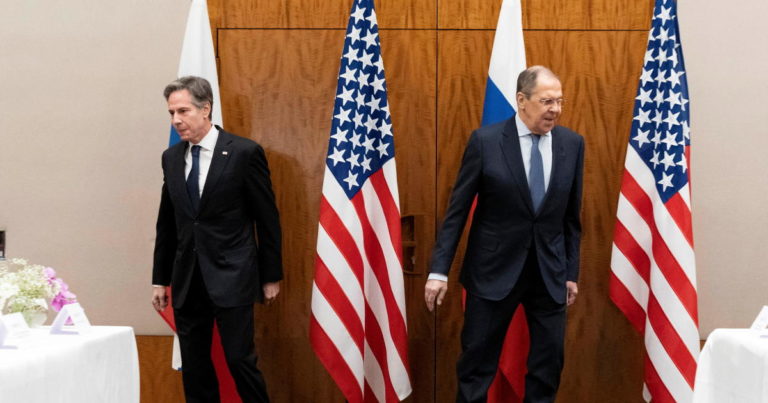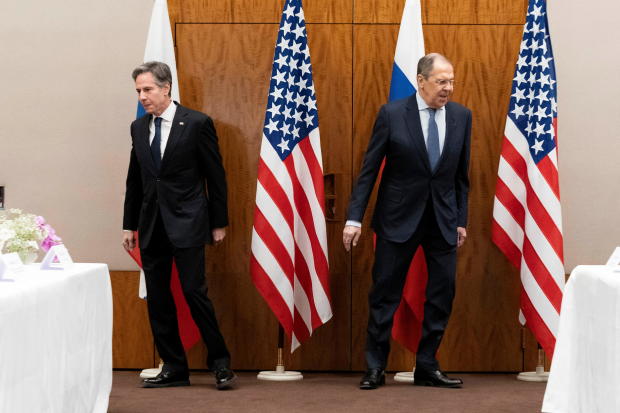
Kyiv, Ukraine — America’s top diplomat, Secretary of State Antony Blinken, met Friday with his Russian counterpart, Foreign Minister Sergey Lavrov, on neutral ground in Geneva to try to ease the tension along the Russian-Ukrainian border. Both men played down expectations of any breakthrough ahead of the talks, but they both emerged after the negotiations indicating that, at the very least, the diplomacy would continue.
Blinken told reporters that he and Lavorov “agreed that it’s important for the diplomatic process to continue.” He said it was “really up to Russia to decide which path it will pursue.”
“I believe we are on a clearer path to understanding each others’ concerns,” Blinken said. America and its European allies were prepared to look for ways to address Russia’s own concerns over NATO’s presence near its borders, but only “in the spirit of reciprocity.”
“I laid out several ideas to reduce tensions and increase security,” Blinken said, noting that the ideas had been formulated with American allies in Europe, and that there could be no resolution to the standoff that failed to secure Ukraine’s self-determination as a sovereign nation.
“If any Russian forces move across Ukraine’s border that’s an invasion,” Blinken said. “It would bring a “swift, severe, and a united response from the United States and our partners and allies.”
There are roughly 100,000 Russian troops massed along Ukraine’s border, and President Joe Biden said this week that his “guess” is that Russia will “move in” to Ukraine.
Mr. Biden has warned that an invasion would be met with tough new economic sanctions against Russian President Vladimir Putin’s regime, and lead to a “consequential” loss of Russian life.
But amid a lack of clear consensus among the U.S. and its NATO allies over exactly how to deter Russia, or how to respond to any hypothetical incursion into Ukraine, the U.S. is still trying to find a diplomatic solution to this crisis.
The Biden administration was hoping to gauge, through Blinken’s meeting with Lavrov, what Putin’s intentions really are, and whether there are concessions that both sides could agree to step back from the brink of war, as NATO and Russia continue moving weapons and forces to the border region.
Ukraine’s capital of Kyiv is almost 5,000 miles from American soil, but the Biden administration has said the conflict — which has simmered in eastern Ukraine since Putin’s forces invaded in 2014 and is now threatening to escalate dramatically — is no simple regional dispute far from American shores.
It’s about protecting democracy, and stopping Russia from turning its neighbors into puppet states, Blinken said this week.
“There is no doubt, let there be no doubt at all, that if Putin makes this choice [to invade Ukraine], Russia will pay a heavy price,” President Biden said this week.
Moscow has consistently denied any intention to invade Ukraine, but has said that if NATO refuses to meet Putin’s demands for “security guarantees,” it could reply with unspecified military action. New satellite images show the massive buildup of Russian troops and weaponry along Ukraine’s borders.
MAXAR TECHNOLOGIES via REUTERS
Mr. Biden has said a Russian incursion might not use conventional tactics, suggesting Putin could instead rely on “paramilitary tactics, so-called grey zone attacks, and actions by soldiers not wearing Russian uniforms.” The U.S. has also voiced concern that Russia could use a so-called “false-flag” operation as a pretext to attack Ukraine.
To step back, Russia has demanded guarantees from NATO, including a total withdrawal of NATO troops from Bulgaria and Romania, and for the Western military alliance to promise it will not admit Ukraine — or any other former Soviet State — as a new member. The U.S. and its partners have called that last demand a non-starter, insisting that NATO membership is for the alliance to decide, not Moscow.
Blinken and Lavrov spoke separately after their talks in Geneva. Lavrov came to a podium first, saying he expected the United States to provide a clear, written response to all of its demands next week. He was dismissive of the U.S. and NATO’s claims that Russia was poised to attack Ukraine, again insisting there were no such plans.
“Today I did not hear a single argument that would substantiate the American position on what is happening on the Russian-Ukrainian border, only concerns, concerns, concerns,” he said. “Our concerns are about real facts that no one hides: pumping weapons into Ukraine, sending hundreds of Western military instructors to Ukraine.”
The U.S. is sending up to $200 million worth of emergency military aid to Ukraine and has authorized its European allies to transfer American-made anti-tank and anti-aircraft weapons to the country. But the U.S. has ruled out sending troop in to bolster Ukraine’s forces.
Many believe Putin’s real motive is to gain control over as much territory in neighboring nations as possible, by any means necessary.
“He works like a terrorist — with nuclear weapons… but he’s still a terrorist,” Ukrainian political analyst Mykola Davydiuk told CBS News.
It’s been 30 years since the collapse of the Soviet Union and the end of the Cold War, but now a European capital is again staring down the barrel of a Russian gun, and Ukrainians are frightened.
“It’s not only threaten for Ukraine, it’s threaten for all the world,” Kyiv resident Natalia told Williams on Friday.
“We want a normal life, how we want it, not anybody telling us what to do,” said another local, Viktor.
Before heading into the closed-door meeting, both Blinken and Lavrov played down expectations.
“We don’t expect to resolve our differences here today,” Blinken told reporters before the 90 minute talks. “But I do hope and expect that we can test whether the path of diplomacy or dialogue remains open.”
“This is a critical moment,” he added.
Lavrov said he didn’t “expect a breakthrough at these negotiations either. What we expect is concrete answers to our concrete proposals.”
Alex Brandon/Pool/Reuters
It was clear that Blinken did not give Russia direct answers to its security demands on Friday.
The chances of Moscow getting the answers it wants — to what it has framed as ultimatums — still looked slim after the senior diplomats’ discussion in Geneva. But they did appear to have at least bought some more time.
The big questions remain, however: How much common ground can the U.S. and Russia find to keep the diplomacy going and a wider armed conflict at bay, and how Putin will respond, as soon as next week, to not getting everything he’s demanded from the West.
Lavrov said he and Blinken expected to speak again soon, after the U.S. provides formal responses to Moscow’s demands.
CBS News’ Tucker Reals contributed to this report.
Download our Free App
For Breaking News & Analysis Download the Free CBS News app
